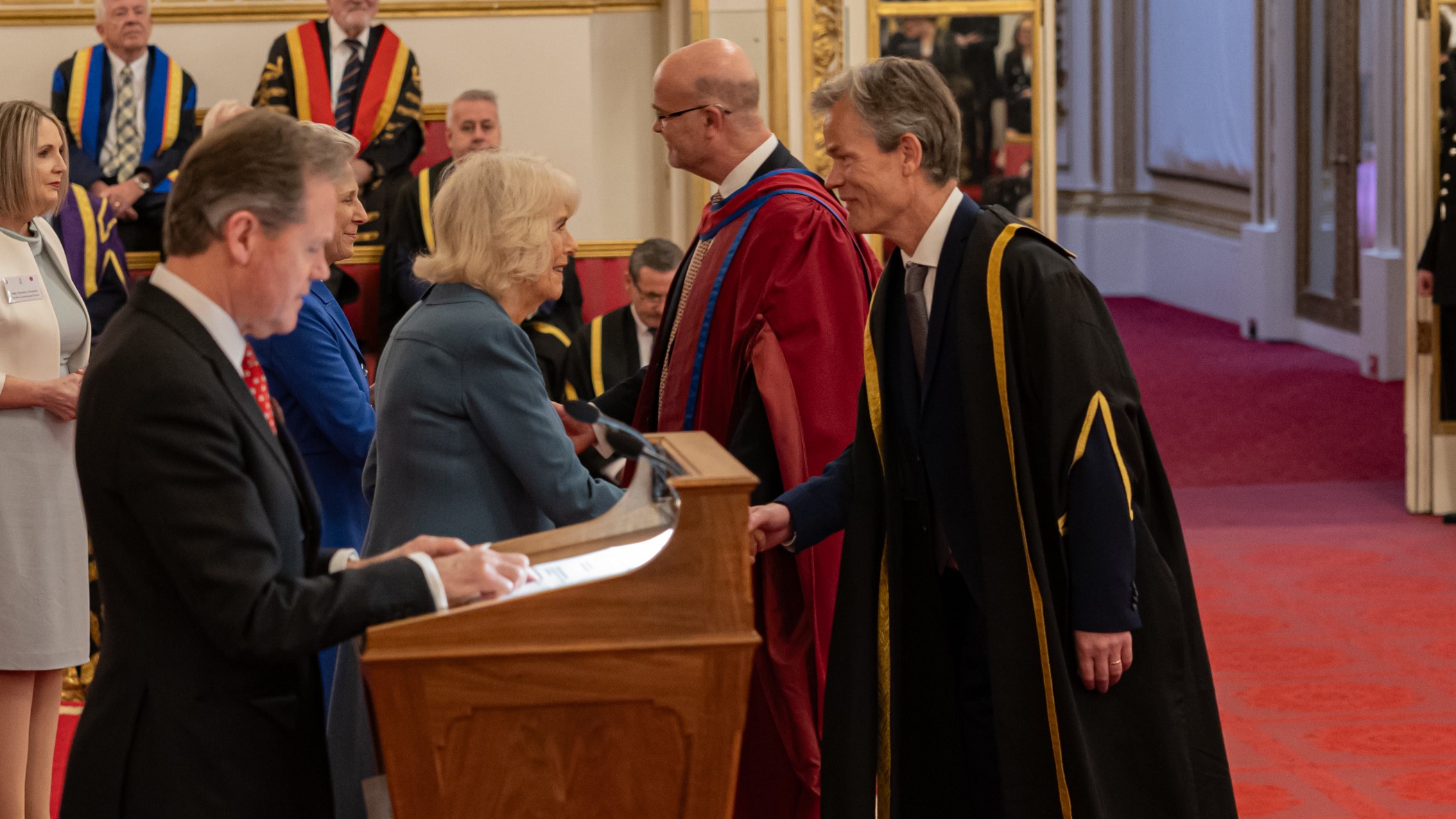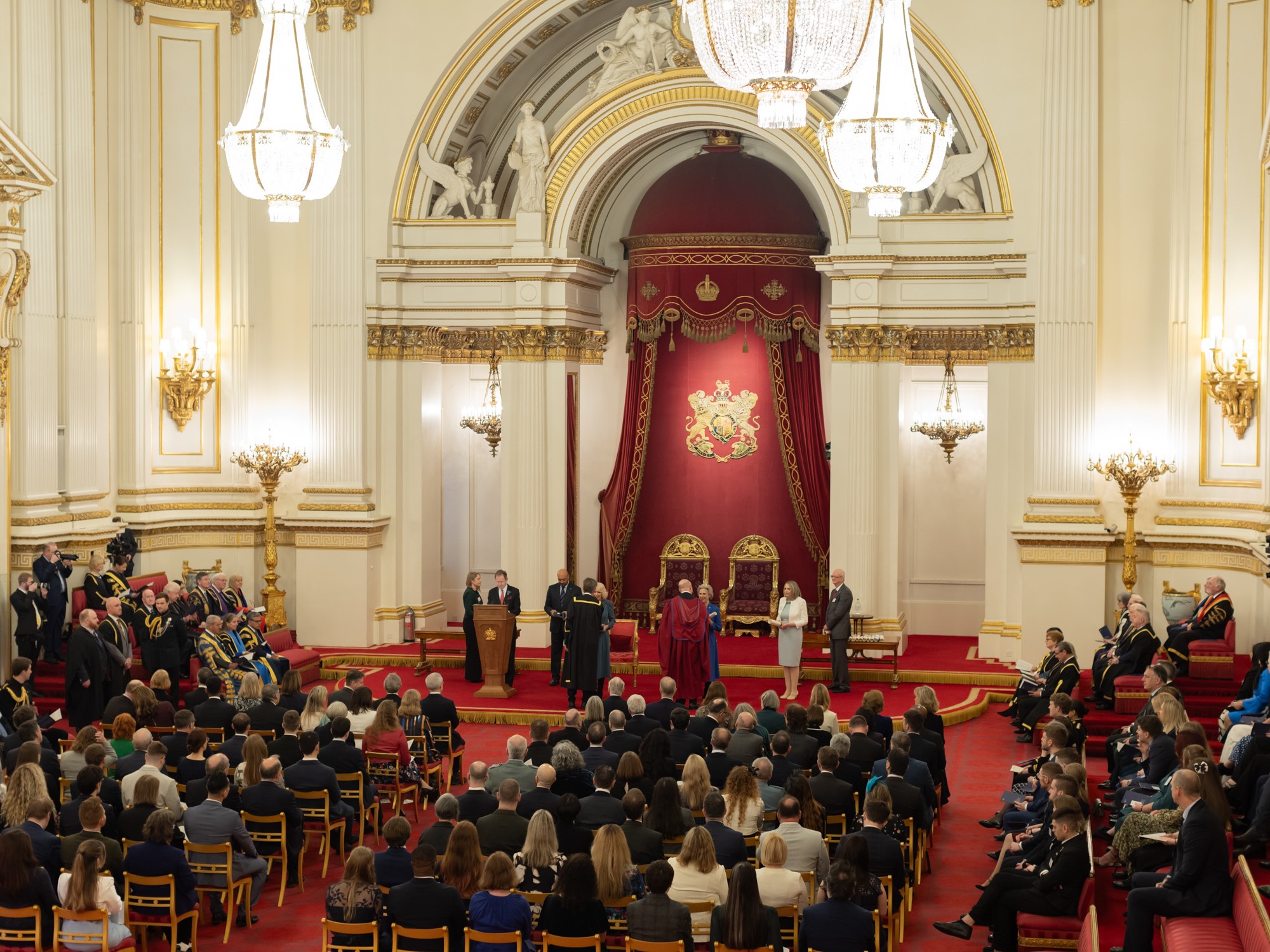
Earlier today, researchers from The Institute of Cancer Research, London, received a prestigious Queen’s Anniversary Prize on behalf of the institute, in recognition of its transformational breast cancer research programme. They attended a formal honours ceremony at Buckingham Palace, where they were presented with a medal and certificate by Her Majesty The Queen and The Duke and Duchess of Gloucester.
This highly regarded prize acknowledges the significant contribution that The Institute of Cancer Research (ICR) has made towards advancing the understanding of how breast cancer develops, spreads and can be treated. This has not only improved outcomes for patients worldwide but also benefitted global healthcare systems and economies.
The ICR was announced as one of the winners of the 2023 Queen’s Anniversary Prizes in November 2023. It is one of the world’s most influential cancer research institutes, having carried out ground-breaking research into the causes, prevention and treatment of cancer for more than 100 years.
Pivotal developments in breast cancer research
Scientists at the ICR are responsible for many discoveries about the risk of breast cancer and how it grows and spreads. They have also led national and international research endeavours with collaborating patients and their care teams that have improved the lives of people with breast cancer around the world.
It was nearly three decades ago that ICR researchers discovered the BRCA2 gene, which led to widespread testing to find faults in the BRCA1 and BRCA2 genes that cause breast cancer. They have since been instrumental in developing new ways of treating BRCA gene-mutated cancers. This work has helped save thousands of lives.
More recently, ICR scientists have led the development and evaluation of new next generation genomic tests that can identify which patients will benefit from chemotherapy or certain targeted treatments for breast cancer. The use of these tests can spare people who are unlikely to need or benefit from chemotherapy from unnecessary side effects. It can also inform decisions to use potentially more effective and personalised targeted treatments to treat people with advanced breast cancers.
The ICR benefits from a close partnership with The Royal Marsden NHS Foundation Trust, which shares sites with the ICR in Chelsea and Sutton. Through the ICR's Clinical Trials and Statistics Unit, the institute also has very strong relationships with a large network of breast cancer care teams and clinical trialists around the UK, with whom it works to design and run trials for people with breast cancer. These partnerships facilitate the translation of lab research into the clinic, meaning scientists’ findings can directly benefit people with cancer.
The ICR also has a longstanding and close relationship with the UK’s leading breast cancer charity, Breast Cancer Now, which established and continues to fund the Breast Cancer Now Toby Robins Research Centre at the ICR. The research centre develops cutting-edge breast cancer science in collaboration with patients and their care teams and with scientists throughout the UK and abroad.
Together, the ICR and Breast Cancer Now have also established the Breast Cancer Now Generations Study, which involves more than 100,000 UK participants and aims to complete our understanding of the causes of breast cancer.
The prize builds on previous awards
This is not the first time the ICR has been awarded a Queen’s Anniversary Prize. His Majesty The King (then His Royal Highness The Prince of Wales) presented ICR scientists with a 2017 prize to recognise the institute’s work in discovering new cancer drugs – an area in which it continues to excel. Indeed, the ICR’s breast cancer research is greatly enabled by the institute’s ability to discover and develop new cancer drugs in collaborative teams.
Rated as the world’s leading academic organisation in the field of cancer drug discovery, the ICR is currently planning the development of the world’s leading district for cancer research and treatment. The institute recently appointed a new partnership to deliver a project called The London Cancer Hub, which will occupy a five-hectare site adjacent to the ICR in Sutton and facilitate innovative collaborations among academics, clinicians, breast cancer charities and industry.
Reaching the “pinnacle of achievement”
The Queen’s Anniversary Prizes for Higher and Further Education are open to eligible universities and colleges in the UK and may be awarded for any topic or subject area that represents excellence, innovation and benefit for the wider world.
Professor Andrew Tutt, Head of the Division of Breast Cancer Research and Director of the Breast Cancer Now Toby Robins Research Centre at the ICR, said:
“We are so grateful and honoured to receive this Queen’s Anniversary Prize on behalf of the ICR. I am proud that our efforts to make discoveries that improve and save the lives of people with breast cancer have been recognised with such an important prize.
“We are delighted that the contribution that scientists at the ICR – working with patients and their care teams nationally and internationally – have already made has been acknowledged in this way, but we know we can do more. We remain highly motivated to keep working with our patients, scientific partners and funders towards our shared mission to help all people with breast cancer live well and to enable many more people to survive the disease.”
Professor Kristian Helin, Chief Executive of the ICR, said:
“The calibre of this round’s winners is, as ever, extraordinarily high, and we are honoured to be celebrated alongside them. The Queen’s Anniversary Prize means so much to us because it closely aligns with the ICR’s values. We aspire to excellence in all of our work, take a collaborative approach to research, lead innovation and do what we can to make a difference for people living with cancer. It’s reassuring to see that these values are helping us deliver the quality of research that is recognised with such a high honour.
“It’s important to acknowledge that the advances we’ve made in breast cancer research would not have been possible without our funders, donors and collaborators, who so generously and graciously donate money and time to support our research.”
Baroness Delyth Morgan, Chief Executive of Breast Cancer Now, who was a member of the party that attended the ceremony, said:
"We’re incredibly proud that Breast Cancer Now-funded researchers are at the core of the world-leading team at the ICR, and I'm delighted that their incredible work has been recognised with such a prestigious award. Breast Cancer Now's collaboration with the team at the ICR has enabled life-changing developments in the diagnosis and treatment of breast cancer, and as a result, more people than ever before are surviving the disease. Working together to drive breakthroughs in research is key to us realising our goal that by 2050, anyone diagnosed with breast cancer lives and is supported to live well."
Sir Damon Buffini, Chair of Royal Anniversary Trust, said:
“The Queen’s Anniversary Prizes for Higher and Further Education are an integral part of our national Honours system, shining a light on the groundbreaking work taking place in universities and colleges across the UK. All 22 prize-winners demonstrate excellence, innovation and impact, with many tackling some of the toughest problems we as a society face today. They are to be commended for reaching this pinnacle of achievement in the tertiary education sector. Congratulations!”
Prime Minister Rishi Sunak, who was involved in selecting the winners, said:
“I want to say a huge congratulations to the winners of the 2022–2024 Queen’s Anniversary Prizes for Higher and Further Education. The sheer breadth and variety of the work is impressive [and] you are pushing the boundaries of what we can achieve. Thanks to your ingenuity, your dedication, and your hard work we are making real progress in science, transforming public health, growing the economy, and improving and enriching people’s lives. As your work shows, there is some extraordinary work taking place in British colleges and universities today – and it is being conducted in a spirit of inquiry, public good and a quest for knowledge. So let me thank all the Queen’s Anniversary Prize winners for everything you are doing.”
The Queen’s Anniversary Prizes for Higher and Further Education are part of the national Honours system, recognising outstanding work by UK universities and colleges that demonstrates excellence, innovation and well-evidenced benefit for education, the economy and the wider world.
First awarded in 1994, the prizes are granted every two years by the Sovereign on the advice of the Prime Minister following a rigorous and independent process of review carried out by The Royal Anniversary Trust, an independent charity.
